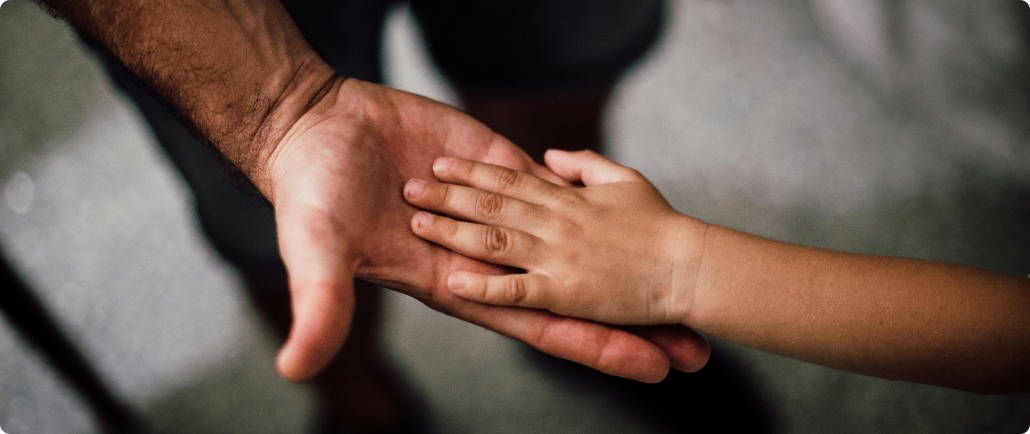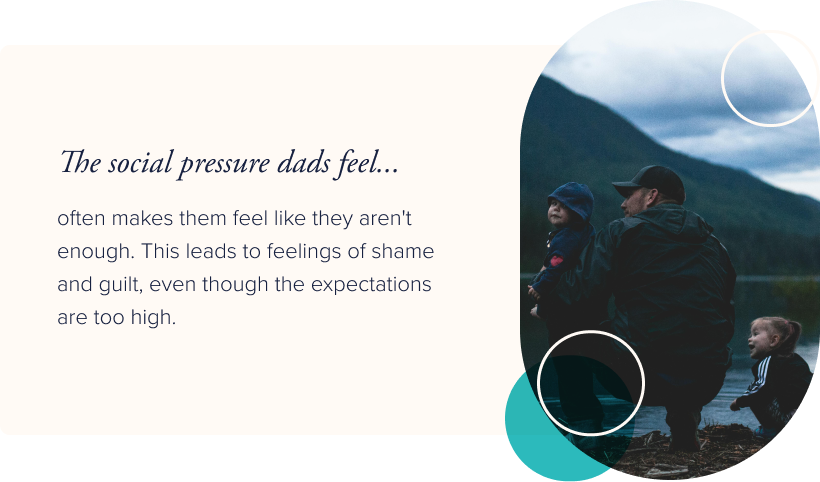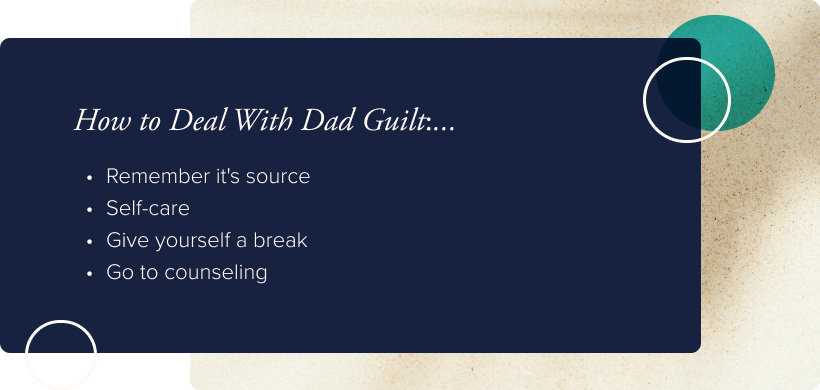
Dad Guilt: When it Never Feels Like Enough

One-on-One Counseling in Arizona for Life's Challenges
Every day is a chance to start over. Our trauma-informed therapists will meet you where you are — in person or online — so you can process your experiences and become the person you want to be.
Dad Guilt: When it Never Feels Like Enough
“Am I doing enough?”
“What if I mess up?”
“What if I have messed up?”
These are questions that echo in fathers’ heads who struggle with dad guilt. Society assumes dads are strong and stoic providers, but behind the mirage there are countless dads who wrestle with a rarely talked about struggle: dad guilt.
Whether it’s guilt over feeling like you’re not being present enough, struggling financially, or questioning your parenting style, dad guilt is a plague that places high, often conflicting expectations on fathers.
In this article we’ll cover everything you need to know about dad guilt, including:
- What it is
- Where it comes from
- What triggers it
- How to avoid it
What is Dad Guilt?
Dad guilt is the feelings of shame, remorse, or inadequacy a dad feels while trying unsuccessfully to meet societal and personal expectations.
It can manifest and be triggered in many ways
- Work-life balance
- Divorce
- Past trauma
- Feeling inadequate
The truth is that being a dad is difficult enough, and the outside pressure and expectation that you’ll be a perfect dad make it that much harder.
Dad Guilt Vs. Mom Guilt
Mom guilt and dad guilt both stem from similar issues, but have different nuances.
Mom guilt stems from the extreme societal pressure to be the primary caregiver.
Society assumes that moms can provide everything for their children, maintain a clean house, and keep their children well-behaved in public. In even families with present and active dads, the mother is considered responsible for these things.
Dad guilt often stems from feelings of being an inadequate caregiver and struggling as a provider.
Dads are socially expected to make enough money for their family, coach their kids' sports games, and be emotionally available at a moment’s notice. However, they also have to deal with the strange assumption that dads are more of a glorified baby sitter than a parent.

Counseling for Dads at Inner Balance
Raising children is a roller coaster of emotions. There will be extreme highs and extreme lows. Our team of dedicated trauma-informed therapists at Inner Balance can offer support through all of it.
Inner Balance Counseling offers mental health counseling in Arizona that can be adapted to whatever you’re experiencing.
Request a consultation and start processing the hurt caused by dad guilt.
Where Does Dad Guilt Come From?
Dad guilt typically doesn’t come from legitimate reasons. There are moments of weakness or mistakes that cause guilt, and sometimes that guilt is encouraging you to own up to your mistakes, apologize, and make amends.
However, dad guilt goes beyond that and instead generates lies and cognitive distortions that make dads feel like they’re inadequate and doing a bad job. These lies can feel like they’re coming from within, but primarily start from external pressures.
The Changing Societal Standards
It was only a couple of decades ago that dads were seen solely as providers and mothers as caregivers. These roles have shifted and blended over time, and for good reason. Coupled parents are partners in raising kids. That means both parents are expected to be caregivers for their children.
This is a good change, but it does lead to confusion for some dads whose fathers were not caregivers.
The new, modern approach to dadding hasn’t been modeled for fathers who are taking on these new responsibilities of the modern dad. Their fathers were the breadwinners and disciplinarians. They haven’t seen what it looks like to be an emotionally present father.
On top of this is the mounting pressure to excel and be perfect as both a caregiver and a provider. This isn’t possible, and will never happen.
Personal Experiences
Fathers who have experienced trauma may find resurfacing trauma and guilt when raising children.
Maybe their experiences with their own father weren't good, and now they’re worried that they won’t be a good dad. Small mistakes feel like huge missteps, and well-meaning corrections sound like personal attacks.
All of this is wrapped in the complex issue that so many men feel unable to talk about how they feel due to the expectations of stoicism and being “strong”.

Things That Trigger Dad-Guilt
Dad guilt comes from external pressure and internal criticism. However, it’s normal for certain events to trigger feelings of guilt or worsen its effects.
Being Belittled or Diminished
Being a dad is a special role, but it can sometimes be lessened compared to the importance of mothers. Especially in the early months of parenting.
Mothers go through so much change and pain throughout pregnancy and during childbirth. As a dad, it may be hard to know how you can shoulder even an ounce of that struggle. Fetching water, ample foot rubs, and picking up food might seem like it’s not important compared to the agony your partner may be experiencing.
Depending on how you and your partner choose to take care of your baby, you may be taking on very different responsibilities than your partner, and that’s ok.
Another consideration is the myth that dads are glorified babysitters. The person who watches the baby while mom can get some rest. This can be frustrating to live with, but know that they’re wrong.
Work-Life Balance
Fathers are rightfully expected to spend ample time with their children.
- Going to games
- Getting up at 2 am to change a diaper
- Putting the baby down for a nap
- Preparing meals
- Etc.
These are good expectations. However, many dads often feel guilt or sadness for not spending enough time with their kids due to work. Dads who work are missing out on time with their children and that’s hard.
Financial Struggles
Depending on how your family is structured, you might be the primary money maker. That means that when financial struggles come, you take responsibility upon yourself. That’s a lot of stress to experience.
Some families prefer that the mother not have to work. However, it’s becoming increasingly harder for fathers to make enough to be the sole provider.
Stay-at-home fathers are also susceptible to experiencing dad guilt triggered by financial struggles. Societal norms and expectations would demand that fathers be providers, but not every family fits that model.
Emotional Blocks & Moments of Anger
Historically, dads have a hard time expressing their emotions. These emotional blocks can cause dads to feel like they’re unable to be emotionally present with their kids.
A similar issue to emotional unavailability, many dads struggle with sudden, strong, and unregulated emotions. Typically anger.
These emotional, or lack thereof, moments are troubling, but they’re common experiences for many dads.
How to Deal With Dad Guilt
Dad guilt might be something you have to navigate your entire life. Societal pressures and familial preferences will always exist. However, there are ways you can mitigate how these things affect you.
As you start to work on the effects of dad guilt, it’s important to remember that the dad society expects you to be cannot exist. It’s unrealistic. All you can do is try to be the best dad in whatever situation you’re in, and that will look different for everyone.
Remember The Real Source of Dad Guilt
Confusion caused by changing roles and the expectations placed on dads is the problem. Unlike the impossibly high expectations placed on moms, dads are almost expected to be incapable mess-ups.
What it means to be a dad is different and the expectations are changing. This can be confusing and frustrating. Especially when you’re trying your best.
Remember that dad guilt doesn’t exist because you’ve done something wrong. Consider the external pressure and expectations that are causing your feelings of guilt.
Work on Self-Care
Some dads will cringe at the idea of practicing self-care. However, self-care can look like any number of things. You don’t need to take a bath and put cucumbers on your eyes.
Many men consider working out and caring for physical health to be the best form of self-care.
- Going for walks
- Drinking enough water
- Going to the gym
- Lifestyle changes
- Etc.
However, self-care should also address the mental load of being a father. Journaling is a huge way dads can take time to reflect on their thoughts and take care of their mental well-being. Mindfulness is important for taking care of yourself.
Give Yourself a Break
If you’re reading this in order to find ways to be a better dad, you probably are already a good dad.
Cut yourself some slack and realize that every dad is in a similar boat, and that the perfect dad doesn’t exist. All you can do is try, and that should be enough.
Forgive Yourself
Past mistakes have a way of sticking around.
Dad guilt has a way of making you feel bad for things you’ve already apologized for. It’s important that when you make a mistake you own up to it, ask for forgiveness, and, often, the hardest part, forgive yourself.
No one is a perfect dad, so don’t expect to be one.
Go to Counseling
Being a parent is hard work. You need all the help you can get. Counseling is one way you can get help for everyday challenges of being a dad as well as dad guilt.
Going to counseling for dad guilt will support your mental health and will support you so you can support your family.

Related blog articles
Sign up for our newsletter
Sign up with your email address to receive news and updates.
Get started
Request a consultation

-03%201.png)




